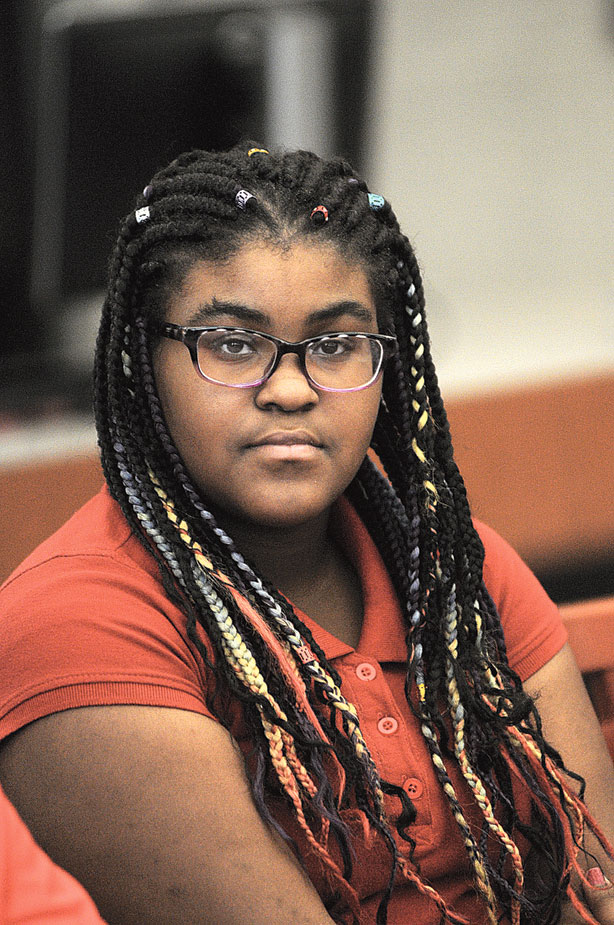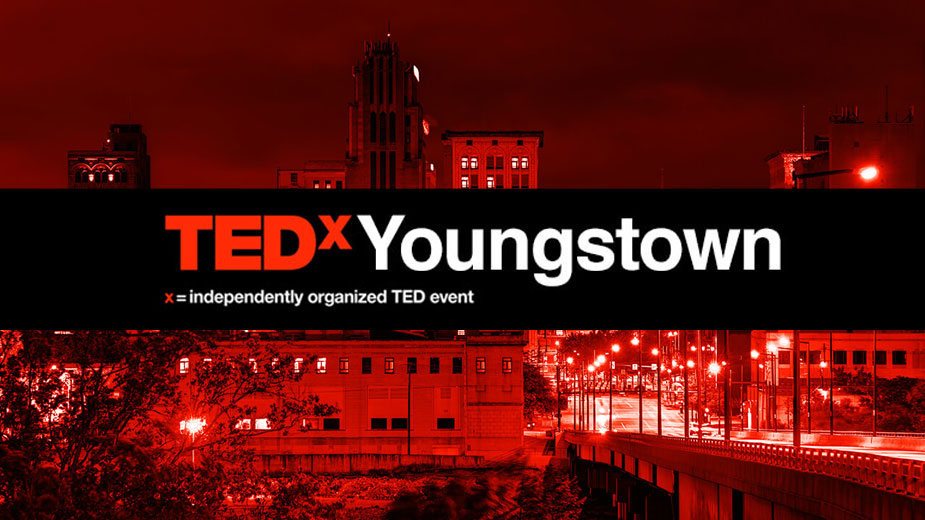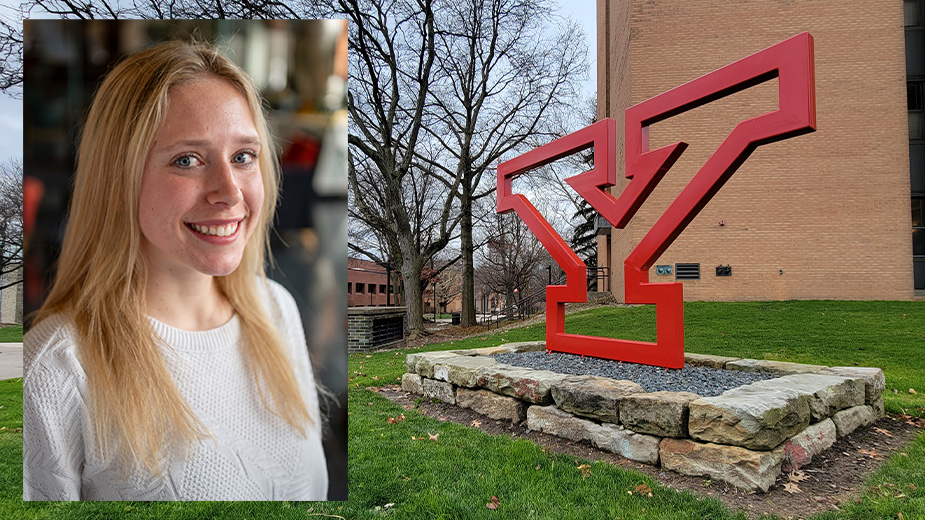It’s Their Community, Too, Middle School Students Say
YOUNGSTOWN, Ohio — Jacob Hodge has been riding motocross since he was 2. When he’s not working on his studies as a sixth grader at Brookfield Middle School, he’ll take his bike into the woods near his house to ride trails.
Recently, he found an area where residents have been dumping refuse, including a couch, mattress and other trash. It bothers Hodge because properly disposing of garbage “is not that hard,” he says, and he doesn’t like seeing it where he rides.
When asked what he plans to do about it, he replies, “I really can’t do anything about it.” If he brought it up to adults in the community, he feels they wouldn’t listen, he says.
Environmental issues – not just globally but in their neighborhoods as well – a dearth of community connections and frustrations with not being heard were voiced repeatedly during discussion panels conducted by The Business Journal with fifth through eighth grade students. Middle schools in Brookfield, Campbell, Springfield and East Palestine, as well as Northeast Ohio Impact Academy, Lowellville, convened for the panels, held in January, as part of the Brain Gain program. The students were selected for participation by their schools.
The main takeaway: problems locally and nationally are not going unnoticed by the region’s youngest residents. For some, finding solutions will determine whether they stay here as adults or move elsewhere.
Many students expressed concern with litter and pollution in their communities. Anthony Lehaman, a seventh grader at East Palestine, says he likes to fish, but the only place to fish is City Lake, which is “not very good to fish at,” he says.
“People go there and throw their trash everywhere, and leave everything everywhere. They don’t pick it up,” he laments. Lehaman isn’t sure if he wants to leave the area after high school, but says keeping the lake clean would go a long way toward getting him to stay.
Likewise, the environment is a big deal to Andrew Drummond, a sixth grader at Brookfield. He and his family walk around their neighborhood picking up trash so local wildlife won’t eat it, he says. Protecting wildlife is one reason why Drummond wants to become a game warden, he says. He’s particularly interested in preventing illegal activities, such as hunting too many deer.
“If they do that illegally, then in 60 years [deer] might not be here anymore,” he says. “The game wardens make sure you’re not doing it when you’re not supposed to.”
During the discussions, other students raised more global issues, including climate change and wildfires in California and Australia.
Claudia Sophio DeRhodes, a seventh grader at the Impact Academy, is concerned with society’s use of finite fossil fuels.
“The whole reason our world is dying is because we’re taking advantage of the fact that the ground is giving us resources and we keep going for more and more even though we don’t need them,” she says. “And we’re not being responsible and we’re not taking as much as we need to survive; we’re taking more than enough just for pleasantries and amenities.”
Issues like litter and climate change affect a child’s perspective on the world from a young age, says Laura Domitrovich, children’s program coordinator at the Trumbull County Mental Health and Recovery Board, “especially when so much of what they’re seeing and hearing is negative.”
It can overwhelm them and make them feel, “I’m just a kid and can’t do anything. Nobody will listen to me,” Domitrovich says. The onus is on adults to talk to kids and listen to their concerns and ideas, she says.
“Oftentimes, kids’ voices are the most powerful voices when they have an opportunity to speak to adults,” she says. “Sometimes as adults, we might minimize how much kids are impacted by what they see and hear on the news.”
Gaining perspective on how young people view the region is one of the goals of the Brain Gain student panels. While middle school students might be too young to be concerned with finding an employer who offers a 401K, having a positive view of their community and feeling connected to it is just as important to them as to young professionals.
In October, at the Rising Rust Belt Summit in West Middlesex, Pa., a panel of young professionals in the region discussed ways the business community can attract and retain their generation. Among the elements discussed, development in the downtowns gives young professionals more reasons to stay, explained Shea MacMillan, business development manager, Youngstown/Warren Regional Chamber.
“You’re seeing they’re not just closing up shops around the courthouse in Warren anymore; there’s a nice variety of eateries,” he said. “In Youngstown, they’ve added some very unique bars and places that people can go to after work and spend their disposable income locally.”
MacMillan’s point wasn’t too far off from what students discussed during the middle school panels. Many of the students say they stay engaged through extracurricular activities, such as sports, band, cheerleading and scouts.
Not all students, however, are necessarily interested in those activities. Responses from some of the students seemed to reflect a lack of amenities.
While Cason Daubenmire, a seventh grader at East Palestine, enjoys the camaraderie and work ethic he feels while playing in the school band, he wants to live in Washington, D.C.
“I never really go out,” Daubenmire says. “I don’t feel connected to the community because I just don’t like the stuff here.”
Eighth graders Mackenzie Parker and William Welch say they enjoy living in East Palestine and spending time with friends, but complain there is a limited number of things to do.
“It does get kind of old,” Parker says. “There’s not very many things to do here other than be with my friends.” She quickly adds, “Which I like to do.”
“It’s not bad. It just gets old,” Welch agrees. “There’s only so much you can do.” Welch would like to have more cultural activities in the area, he adds.
While young people lamenting nothing to do isn’t novel, the Trumbull Mental Health Board’s Domitrovich cautions community members not to dismiss such opinions.
“They have real thoughts and emotions and opinions. Sometimes for a variety of reasons, sometimes people brush them off to the side,” Domitrovich says. “There’s so much wisdom in what our kids say and think and see the world. We need to do a better job of letting them know that they’re heard and they’re understood.”

During her 22-year career in children’s mental health, she’s found that having a sense of connection and belonging to one’s community and peers is “essential for the well-being of young people,” she says. Children connected to the community tend to get better grades and are less likely to abuse substances,” she says.
“It’s important for adults in kids’ lives to give them opportunities to have different life experiences to kind of find what their niche is going to be,” Domitrovich says. “I don’t know that we always have those opportunities where kids feel welcome and safe and their voice will be heard.”
It might also encourage them to stay in the community and become part of the workforce – the brain gain and not join the brain drain.
“The more our youth and young adults feel connected to their community, feel a sense of purpose and feel like they belong, the more likely they are to want to remain here and seek local employment opportunities, rather than moving elsewhere,” Domitrovich says. “If we engage youth in conversations and truly listen to their thoughts, we can get a better idea of what would make them more likely to remain here rather than moving on and taking their talents elsewhere.”
In fact, some of the student panelists expressed interest in careers directly related to what they are seeing. And concerns over larger issues are inspiring career interests.
Peter Odell, a fifth grader at Brookfield, talked with his parents after seeing stories about mass shootings and school shootings in the news. It’s inspired him to pursue psychiatry after high school to help individuals who might be contemplating violence against others or themselves, he says.
“There’s many innocent kids that want to do things and don’t want to be harmed or be disturbed because someone has mental problems,” he says.

Both Kasharee Maddox, a seventh grader at Campbell, and Impact Academy eighth grader Charley McMasters say they want to be lawyers to help individuals who might be under-represented.
“I see so many innocent people who are getting accused of stuff they really didn’t do,” Maddox says.
After law school, hopefully at Stanford University, McMasters hopes to return to Campbell to work at the Mahoning County Juvenile Court so she can help at-risk youth “make better decisions and get their life back on track,” she says. “Eventually, I want to become a judge.”
Encouraging students to volunteer also provides them with a sense of purpose within their community, says Domitrovich, who recalls the sense of belonging she felt while she volunteered in area soup kitchens with her parents when she was growing up. While such opportunities exist for at-risk youth, she was surprised to learn that some organizations have turned kids away.
“A lot of kids were having a lot of doors shut for them when they were just trying to volunteer and help,” she says.
Nevertheless, some find opportunities to serve, usually with their families.
Sixth grader Amaya Abeid, Springfield, says she doesn’t go to many of the football games, but volunteers in her neighborhood. When she’s older, she hopes to help with a food pantry her grandmother organized, she says.
Blake Poole, an eighth grader from Springfield, says he and his brother raise funds for the ALS Association in Ohio, which is important to him since his mother was diagnosed with the disease. Whatever helps his mother the most is what’s most important to him in a community, he says.
“She’s my best friend,” Poole says. “And whatever can help benefit her the best is what my best interest is.”
Brianne Carnahan, a fifth grader at Springfield, is part of the school’s newspaper club, which donates proceeds from sales of the 25-cent paper to an area nonprofit. This year, the club is donating to Angels for Animals.
“That’s been my article for the past three newspapers,” she says.
Their classmate, Owen Wonner, is involved with 4-H and says farming connects him to the community. When neighboring farms need help with something, the eighth grader’s family assists when needed. One of his neighbors has a prosthetic leg and usually needs help around the house, he says.
“Sometimes he won’t admit he needs help, but he needs help,” he says. “So we’ll show up and try to help him as much as we can.”
And while many students lament the lack of recreational activities, Campbell’s Jenuel Roman, in the seventh grade, has an idea to renovate an abandoned building near the police station into a recreation center.
“I don’t think there’s a rec center anywhere near here,” Roman says. “We could just go there and everyone can relax and have a nice day if they’re not doing anything.”
He’s already talked to his grandmother about the idea and plans to circulate a petition on weekends.
The students’ comments were eye-opening for Robert Egglestein, lead career counselor at the Mahoning County Educational Service Center, who attended two of the panels. He was surprised by “how aware some of the kids are” about specific issues, he says.
“They’re noticing some of the negatives that are in the city. Whether that’s through reading things on the internet or hearing them from parents, they do have an understanding that there are things going on that might not be good and need to be addressed and fixed,” he says.
Some students, however, might not recognize how events connect them to the community, such as recent fundraisers to support an East Palestine student who suffered a stroke, Egglestein contends. If students don’t recognize how that connects them to the community, then the schools “need to be better at showing them the impact of what they’re doing,” he says.
“What they’re really doing is changing somebody’s life.”
Insights from the panel discussions give community leaders and residents a chance to hear what the students have to say about issues specific to their communities, Egglestein agrees. Now, it’s up to the educators and community to address those issues so the students know their voices have been heard.
“As long as the people in the schools, the community and the decision-makers take them for what they’re worth and understand that it’s not just negative, they can use this to make a positive difference in their community,” he says.
Copyright 2024 The Business Journal, Youngstown, Ohio.


